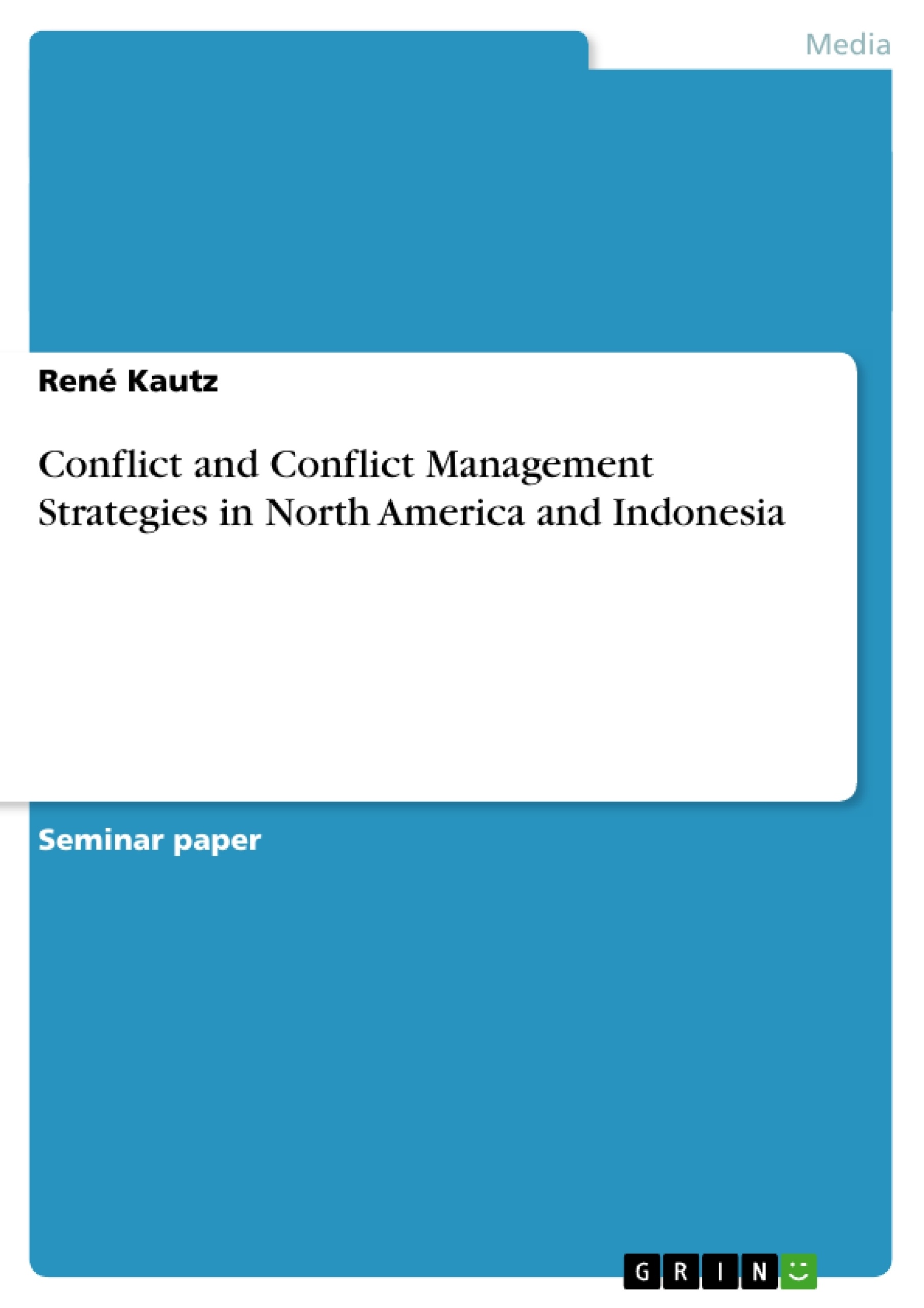Through the process of globalization, managers often have to deal with people from other countries with different cultural backgrounds. This cultural background includes not only the language; it means a completely different way of feeling, thinking, behaving and as a result also conflict management. Constructive conflict management is a competence which is of particular importance in international management. Furthermore, in an intercultural context, a manager not only needs to know how to handle conflicts in general, but also how his negotiation partners usually deal with them. This is important because the right way to solve a conflict i. e. in North America is not necessarily the right way in Indonesia. When coping with conflicts in international business negotiations, international managers must be aware of the fact that appropriate ways of solving conflicts in Western cultures like North America can very often be completely unacceptable in Asian cultures like Indonesia. The aim of this paper is to analyse typical conflict management strategies in North America and Indonesia, thereby highlighting major differences in appropriate conflict management between them.
Inhaltsverzeichnis (Table of Contents)
- INTRODUCTION
- WHAT IS A CONFLICT? IMPORTANT DISTINCTIONS
- CONFLICT AND CONFLICT MANAGEMENT IN NORTH AMERICA
- CULTURAL BACKGROUND TO CONFLICT MANAGEMENT
- North American culture
- Norms and values
- Competition
- DEALING WITH CONFLICTS
- Perceived conflict
- Conflict behaviour
- Conflict Management
- Specific approaches
- Third party assistance
- Adjudication
- Mediation
- CONFLICT AND CONFLICT MANAGEMENT IN INDONESIA
- CULTURAL BACKGROUND TO CONFLICT MANAGEMENT
- Indonesian culture
- Norms and values
- Harmony
- Hierarchy
- Musyawarah and mufakat
- DEALING WITH CONFLICTS
- Perceived conflict
- Conflict behaviour
- Conflict Management
- Specific approaches
- Traditional culture in business life
- MAIN DIFFERENCES IN DEALING WITH CONFLICTS
- CONCLUSION
Zielsetzung und Themenschwerpunkte (Objectives and Key Themes)
The aim of this paper is to analyze typical conflict management strategies in North America and Indonesia, thereby highlighting major differences in appropriate conflict management between them. The paper examines how cultural background influences the perception and management of conflict in these two regions.
- Cultural differences in conflict management styles
- The impact of individualism vs. collectivism on conflict resolution
- Specific approaches to conflict management in North America and Indonesia
- The role of cultural norms and values in conflict behavior
- Examples of intercultural conflicts and their resolution
Zusammenfassung der Kapitel (Chapter Summaries)
- Introduction: This chapter introduces the topic of intercultural conflict management and its importance in the globalized business world. It emphasizes the need to understand cultural differences in conflict resolution strategies, highlighting the contrasting approaches of North America and Indonesia.
- What is a conflict? Important distinctions: This chapter defines conflict and differentiates it from other forms of disagreement. It explores different perspectives on conflict, highlighting the potential for constructive conflict resolution.
- Conflict and conflict management in North America: This chapter examines the cultural background and conflict management styles prevalent in North America. It explores the impact of individualistic culture and competition on conflict perception and resolution.
- Conflict and conflict management in Indonesia: This chapter analyzes the cultural background and conflict management strategies in Indonesia. It explores the impact of collectivistic culture and emphasis on harmony on conflict perception and resolution.
Schlüsselwörter (Keywords)
This paper focuses on intercultural conflict management, analyzing the cultural differences in conflict resolution strategies between North America and Indonesia. Key concepts include individualism vs. collectivism, cultural norms and values, negotiation styles, mediation, adjudication, and culturally specific conflict management approaches.
Frequently Asked Questions
What are the main differences in conflict management between North America and Indonesia?
North American styles are often direct and competitive, focusing on individualism, while Indonesian styles prioritize harmony, hierarchy, and indirect communication.
What is "Musyawarah and Mufakat" in Indonesian culture?
It refers to the traditional process of deliberation (musyawarah) to reach a consensus (mufakat), which is central to Indonesian conflict resolution.
How does individualism affect conflict behavior in North America?
Individualism leads to a more confrontational approach where personal goals and rights are often prioritized over group harmony.
What role does "Harmony" play in Indonesian business negotiations?
Maintaining "face" and social harmony is crucial; direct confrontation is often avoided as it is considered unacceptable in many Asian cultures.
Why is intercultural competence important for international managers?
Managers must understand that a resolution strategy effective in the West might be offensive or ineffective in an Eastern context like Indonesia.
- Citar trabajo
- René Kautz (Autor), 2004, Conflict and Conflict Management Strategies in North America and Indonesia, Múnich, GRIN Verlag, https://www.grin.com/document/23396



